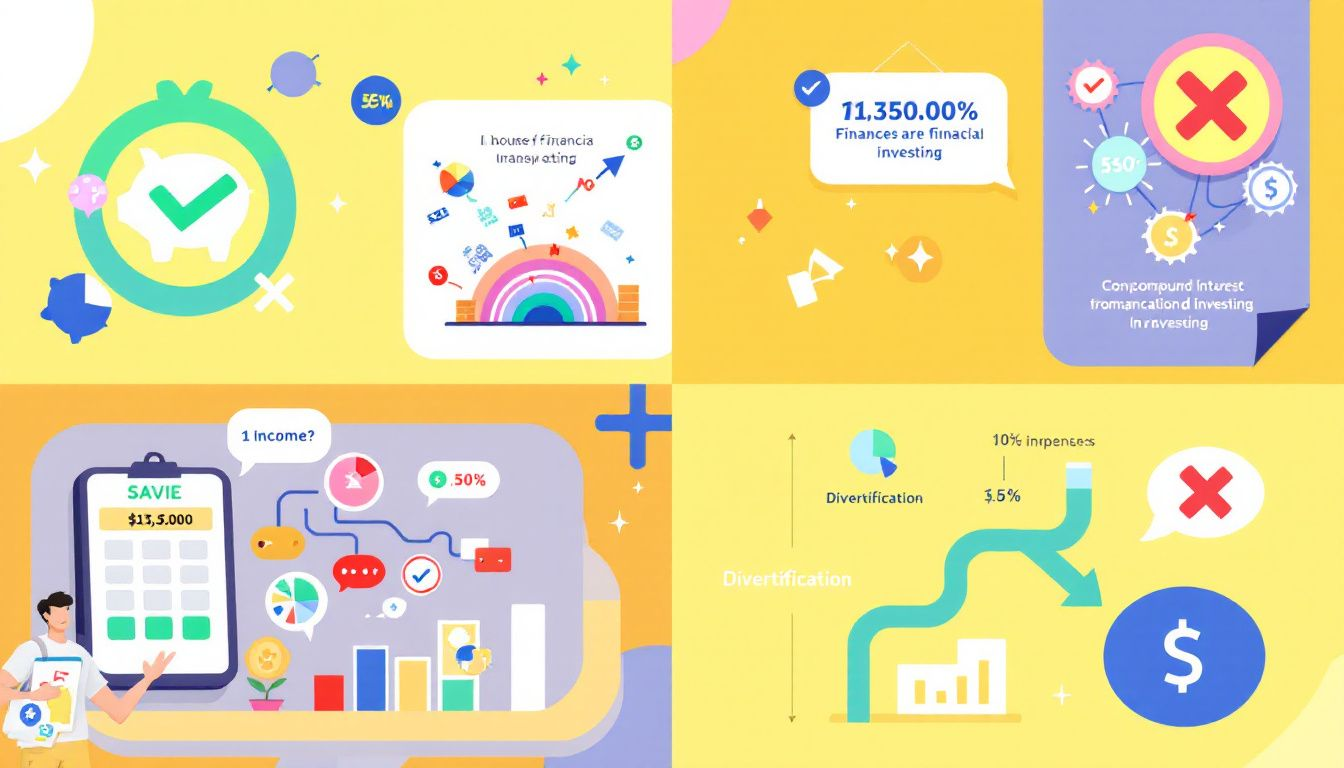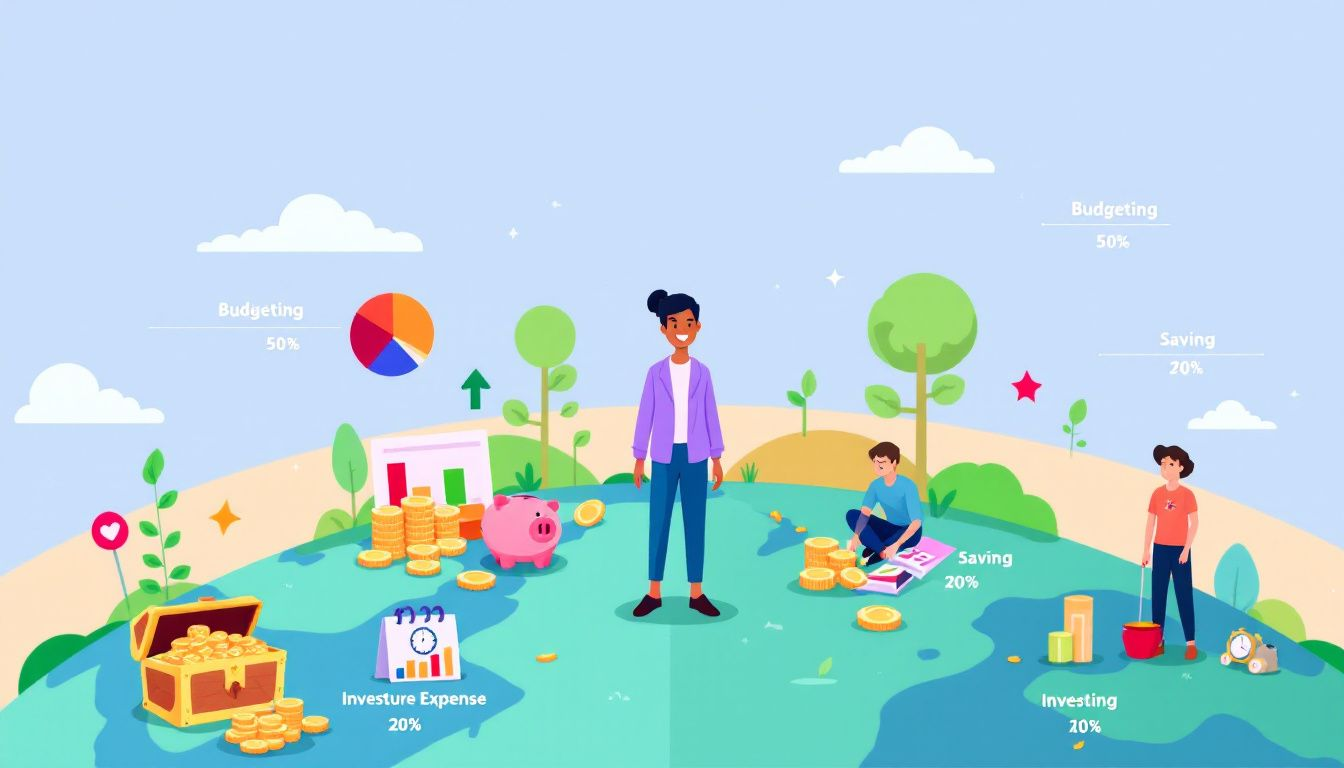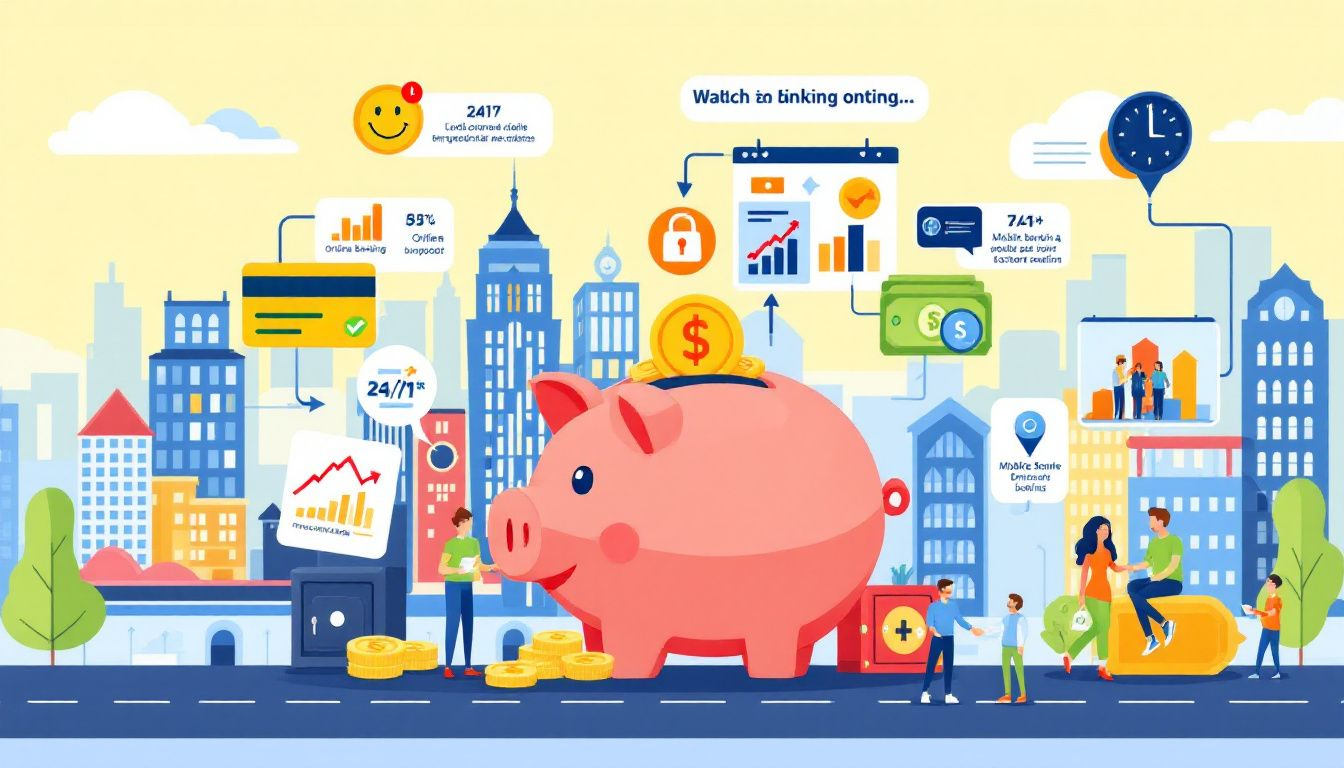Want to improve financial literacy? Being financially literate helps you make smarter choices with your money, reducing stress and improving your financial well-being. This article will provide practical, actionable steps to enhance your budgeting, saving, investing, and debt management skills.
Key Takeaways
- Financial literacy encompasses critical skills in budgeting, saving, investing, and debt management, essential for informed decision-making and financial stability.
- Engaging with various resources such as books, online courses, financial news, and professional advice can significantly enhance one’s financial literacy.
- Establishing a robust personal budget and an emergency fund is vital for managing finances effectively and ensuring preparedness for unforeseen expenses.
Understanding Financial Literacy

Financial literacy refers to the ability to understand different financial skills. These skills include personal management, budgeting, and investing. It encompasses the skills and knowledge essential for making informed financial decisions and managing resources. Whether it’s navigating complex financial products or simply managing day-to-day expenses, financial literacy is the cornerstone of a secure financial future. It empowers individuals to make informed decisions about money, reducing financial stress and increasing security.
The benefits of financial literacy are manifold. A solid understanding of financial concepts aids individuals in organizing their finances effectively. It helps avoid poor financial decisions, achieve self-sufficiency, and attain financial stability. Consulting reliable financial sources allows individuals to make informed decisions about significant expenses. Consulting financial experts can also clarify complex financial situations, making it easier to navigate financial decisions.
Understanding earning, budgeting, borrowing, and investing is key to making effective financial decisions.
Key Areas of Financial Literacy

Financial literacy is not a one-dimensional concept; it spans several key areas that collectively ensure financial well-being. These areas include:
- Budgeting
- Saving
- Investing
- Debt management
Creating a budget helps individuals control their spending and allocate their income toward expenses and savings.
Saving is about setting aside money for future needs and unforeseen expenses, while investing involves understanding different asset types and their associated risks. Debt management is another crucial area, as it involves understanding how to handle borrowing and repayment effectively.
Staying updated with financial news can aid in identifying emerging trends in money management. Investing early and consistently, such as through retirement planning accounts, can significantly grow savings over time. Workshops and seminars often cover various topics, from budgeting techniques to investment strategies, enhancing overall financial literacy. A holistic approach to financial health involves engaging in these areas.
Practical Ways to Enhance Financial Literacy
Before:
There are numerous practical ways to enhance financial literacy, each offering unique benefits. Engaging with a variety of methods can greatly improve one’s understanding of finance. Explore reading books, taking courses, following financial news and blogs, using financial apps, attending workshops, and consulting professionals for advice. Each of these methods provides a different perspective and depth of understanding, catering to various learning styles and preferences.
After:
Here are some practical ways to enhance financial literacy:
- Reading books
- Taking courses
- Following financial news and blogs
- Using financial apps
- Attending workshops
- Consulting professionals for advice
Each of these methods provides a different perspective and depth of understanding, catering to various learning styles and preferences.
Reading books and articles on personal finance is an excellent starting point. These resources often cover essential topics such as budgeting, saving, investing, and managing debt. Books provide comprehensive insights and allow readers to explore financial concepts at their own pace. Online courses provide structured learning for both beginners and advanced learners. They provide a thorough understanding of various financial topics. They also include practical strategies for application.
Keeping up with financial news and blogs ensures you stay informed about the latest trends and investment opportunities. Regular engagement with financial content can significantly improve personal finance knowledge and decision-making skills. Combining these methods builds a robust foundation of financial knowledge, enabling informed decisions and financial stability.
Read Books and Articles on Personal Finance
Books and articles on personal finance are proven tools for enhancing financial literacy. Essential topics covered in financial literacy books include budgeting, saving, investing, and managing debt. These resources offer in-depth insights and practical advice for everyday financial decisions.
Regardless of experience level, these resources offer new insights for both novices and seasoned investors.
Enroll in Online Courses
Online courses are invaluable for enhancing financial literacy. Both free and paid online courses on personal finance and investing cater to different expertise levels. They offer structured learning environments for progressing from basic to advanced financial topics. Participating in these courses provides a comprehensive understanding of financial topics, from budgeting to investing.
Titles like ‘Get Good with Money’ provide practical worksheets to help individuals assess their financial situations. These courses often include interactive elements such as quizzes and real-life scenarios, making the learning process engaging and practical.
For college students and young people, these courses offer a solid foundation for future financial success, equipping them with the skills needed to navigate the financial world confidently.
Follow Financial News and Blogs
Staying updated with financial news and blogs is essential for making informed financial decisions. Following financial blogs and websites is a recommended way to enhance financial literacy. Reliable financial news sources help individuals track money management trends and investment opportunities. Regular engagement with financial content can significantly improve personal finance knowledge and decision-making skills.
Staying informed about the latest developments helps you make timely financial decisions aligned with your goals.
Engaging with Financial Tools and Resources

Utilizing financial tools and resources can significantly enhance your financial literacy and empower informed decision-making. Budgeting methods like the 50/30/20 rule help manage expenses based on needs, wants, and savings. Regular budget reviews ensure alignment with your current financial situation and goals. Using financial tools and resources leads to better financial decisions and overall improved financial health.
Financial applications aid in budgeting, expense tracking, and investment monitoring. They automate financial tracking, providing convenience and a comprehensive view of personal finances.
Workshops and seminars provide valuable tips and guidance from financial experts. Consulting a financial advisor offers personalized guidance, particularly for those facing complex financial situations or specific goals. By leveraging these tools and resources, you can enhance your financial literacy and achieve greater financial stability.
Utilize Financial Apps
Financial applications are a game-changer for personal finance management. They help with budgeting, expense tracking, and investment monitoring. Budgeting apps enhance financial awareness by helping users track their expenditures in real-time. They automate financial tracking, providing convenience and a comprehensive view of personal finances.
Many budgeting apps provide customizable features tailored to individual financial goals, such as saving or debt reduction. By streamlining the management of personal finances, these apps make it easier to make informed financial decisions.
Attend Workshops and Seminars
Attending workshops and seminars is a fantastic way to enhance your financial literacy. Financial experts offer valuable tips through these events. Participants can gain valuable guidance from experts’ insights. Whether local or virtual, workshops and seminars offer practical insights that can be immediately applied to manage your finances better.
Look for opportunities in your local area or online to join workshops and seminars designed for improving financial literacy.
Seek Professional Financial Advice
Financial advisors provide invaluable personalized guidance, especially for complex financial situations or specific goals. A qualified advisor helps craft financial plans, answers important investment questions, and assists in managing finances effectively. Whether you’re dealing with unexpected financial challenges or planning for retirement, tailored financial guidance is essential to navigate the complicated financial landscape.
When consulting, consider your specific financial goals and any complex situations. This personalized approach ensures your financial plan aligns with your unique needs and objectives, aiding in achieving financial stability and success.
Building a Strong Foundation in Banking

A strong foundation in banking is crucial for effective personal finance management. Bank accounts are safer than holding cash and are the first step in creating a stable financial future. Bank accounts assist in managing and accumulating funds for significant purchases. Bank accounts also support important life events. In the U.S., 6% of households do not have a bank account, highlighting the importance of financial inclusion. Grasping the significance of bank accounts is key to effective personal finance management.
Different types of bank accounts, such as savings, checking, and high-yield savings accounts, offer various benefits and uses. Savings accounts generally provide interest on deposits, making them ideal for growing savings over time. High-yield savings accounts offer higher interest rates but may require larger initial deposits. Understanding these options helps you choose the right account to meet your financial needs and goals.
Types of Bank Accounts
The three main types of bank accounts are savings accounts, checking accounts, and high-yield savings accounts. A checking account allows deposits and withdrawals, providing high liquidity but earning little to no interest. These accounts are ideal for everyday transactions like paying bills and making purchases.
Savings accounts, on the other hand, typically provide interest on deposits, making them a good choice for growing savings over time. High-yield savings accounts offer an even higher interest rate but usually require a larger initial deposit. Knowing the benefits and uses of each type of account helps you make informed decisions about where to keep your money.
Online vs. Traditional Banks
The financial world includes various types of banks, such as online banks and traditional brick-and-mortar institutions. Online banks offer similar services to traditional banks but lack physical branches, often resulting in lower fees. They generally offer higher interest rates on savings accounts compared to traditional banks. Online banks are an excellent choice for those comfortable with digital banking.
Traditional banks, or brick-and-mortar institutions, provide face-to-face customer service and in-person transactions. They may have higher fees, but many value the personal interaction and ability to handle banking matters in person.
Credit unions, as not-for-profit financial institutions, usually offer lower fees and better rates than retail banks. Knowing the pros and cons of each type of bank can guide you in choosing the best option for your financial needs.
Mastering Credit and Debt Management
Effective credit and debt management is essential for maintaining financial health. Distinguishing between good and bad debt is crucial for effective debt management. Good debt, like a mortgage or student loans, offers long-term benefits, whereas bad debt, like high-interest credit card debt, can be financially draining. Managing these differences is key to achieving financial stability.
Credit cards are common financial tools with their own set of risks and benefits. Regularly checking monthly credit card statements helps identify unauthorized charges quickly. Obtaining your free annual credit report from major agencies helps monitor your credit for signs of identity theft. Staying vigilant and informed helps you use credit responsibly and avoid potential pitfalls.
Effective debt management requires a strategic approach. Here are some key strategies to consider:
- Minimize debt and be conscious of interest rates to ensure payments align with your budget.
- Keep your debt-to-income ratio below 35% when seeking additional credit.
- Pay more than the minimum due on loans to reduce total debt faster and minimize interest costs.
By following these strategies, you can manage your debt more effectively.
Regular credit report monitoring helps identify improvement opportunities and ensure accuracy.
Understanding Credit Cards
Credit cards are accounts that allow borrowing money and paying it back over time. Unlike debit cards that withdraw funds directly from your checking account, credit cards allow borrowing money for purchases and repaying it later. Failing to pay off your credit card balance in full results in interest accruing over time, potentially costing you hundreds or even thousands of dollars.
The Equal Credit Opportunity Act (ECOA) protects individuals in their credit opportunities, influenced by responsible credit card management. Responsible credit card use builds a strong credit history, making it easier to borrow money at better interest rates in the future. Misuse, however, can lead to bad credit, making it difficult to secure loans or credit cards with favorable terms.
Managing Debt Effectively
Managing debt effectively is crucial for financial well-being. It’s advisable to minimize debt; if necessary, be conscious of interest rates and ensure payments align with your budget. Keeping your debt-to-income ratio below 35% is crucial when seeking additional credit. Paying more than the minimum due on loans reduces total debt faster and minimizes interest costs. Regular credit report monitoring helps identify improvement opportunities and ensure accuracy.
Keeping a credit utilization ratio below 30% positively impacts your credit score. Closing credit card accounts may unintentionally lower your credit score by reducing available credit. Effective debt management improves financial stability and sets you up for a secure financial future.
Introduction to Investing

Investing involves partial ownership in assets like stocks, which can yield returns but also come with inherent risks. Investing is a powerful tool for building wealth and securing your financial future. Assessing risks and rewards, based on individual goals and market conditions, is crucial.
Types of investments include stocks, bonds, mutual funds, and ETFs. Investing in U.S. Treasury securities is considered safer, although inflation can erode purchasing power over time. ETFs, which track an index, provide diversification and managed investment options similar to mutual funds. They can be less risky than individual stocks due to containing multiple securities, balancing potential risks.
Financial advisors can help tailor investment strategies to fit individual needs and risk tolerance. Understanding investing basics enables informed decisions that align with your financial goals.
Creating a Personal Budget
A personal budget is fundamental to managing finances effectively. Tracking monthly income and expenses is the first step in creating a budget. Calculate both to develop a suitable financial plan. Tracking all expenditures ensures adherence to a budget.
Clear short-term and long-term goals guide the budgeting process. Automatic transfers to a savings account help in consistently building an emergency fund. Understanding spending habits and making informed decisions leads to financial stability and goal achievement.
Importance of Emergency Funds
An emergency fund is a cash reserve for financial hardships. Establishing an emergency fund, aiming to save three to six months’ expenses, is crucial for financial security. An emergency fund serves as a financial cushion for unforeseen expenses, such as medical bills or car repairs.
Building an emergency fund can prevent reliance on credit cards for unexpected expenses. Having a reserve of cash can prevent individuals from relying on credit cards or loans during financial emergencies.
The ideal amount for an emergency fund varies, but it should be based on past unexpected expenses.
Protecting Your Financial Information
Protecting your financial information is crucial in today’s digital age. Carrying only essential items in your wallet minimizes the risk of exposing sensitive information if lost or stolen. Regularly shredding bank statements and credit offers can help prevent identity thieves from accessing your personal data.
Collecting mail promptly and avoiding mailing sensitive payments from home reduces exposure to theft. Removing your name from marketing lists can help reduce the amount of unsolicited personal information circulating about you.
By taking these steps, you can safeguard your personal financial data and protect yourself from identity theft.
Summary
Financial literacy is the cornerstone of a secure financial future. By understanding key areas such as budgeting, saving, investing, and debt management, you can make informed financial decisions and achieve financial stability. Engaging with various tools and resources, such as financial apps, workshops, and professional advisors, further enhances your financial literacy.
Taking control of your personal finance involves creating a budget, building an emergency fund, and protecting your financial information. By following the strategies outlined in this blog post, you can improve your financial well-being and set yourself up for long-term success. Remember, financial literacy is a journey, and every step you take brings you closer to achieving your financial goals.
Frequently Asked Questions
What is financial literacy?
Financial literacy is the essential skill of understanding and utilizing financial knowledge for personal management, budgeting, and investing effectively. It empowers individuals to make informed financial decisions.
Why is creating a budget important?
Creating a budget is important because it enables individuals to control their spending and effectively allocate their income towards both expenses and savings. This practice promotes financial stability and helps achieve long-term financial goals.
How can I improve my financial literacy?
To improve your financial literacy, consider reading relevant books, enrolling in financial courses, and following trustworthy news sources and blogs. Engaging with financial apps and attending workshops can also provide practical insights.
What are the benefits of an emergency fund?
An emergency fund provides financial security against unexpected expenses, helping to avoid reliance on credit. This cushion can alleviate stress and maintain your financial stability during challenging times.
How can I protect my financial information?
To protect your financial information, carry only essential items in your wallet, shred bank statements regularly, and collect your mail promptly. Taking these steps can significantly reduce your risk of identity theft.
